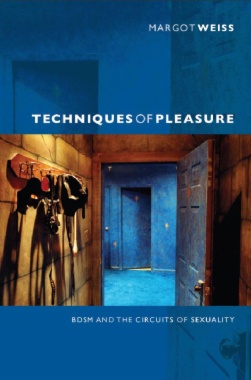Techniques of Pleasure is a vivid portrayal of the San Francisco Bay Area’s pansexual BDSM (SM) community. Margot Weiss conducted ethnographic research at dungeon play parties and at workshops on bondage, role play, and flogging, and she interviewed more than sixty SM practitioners. She describes a scene devoted to a form of erotic play organized around technique, rules and regulations, consumerism, and self-mastery. Challenging the notion that SM is inherently transgressive, Weiss links the development of commodity-oriented sexual communities and the expanding market for sex toys to the eroticization of gendered, racialized, and national inequalities. She analyzes the politics of BDSM’s spectacular performances, including those that dramatize heterosexual male dominance, slave auctions, and US imperialism, and contends that the SM scene is not a “safe space” separate from real-world inequality. It depends, like all sexual desire, on social hierarchies. Based on this analysis, Weiss theorizes late-capitalist sexuality as a circuit—one connecting the promise of new emancipatory pleasures to the reproduction of raced and gendered social norms.
- Contents
- A Note on Terminology
- Acknowledgments
- Introduction: Toward a Performative Materialism
- One: Setting the Scene: SM Communities in the San Francisco Bay Area
- Two: Becoming a Practitioner: Self-Mastery, Social Control, and the Biopolitics of SM
- Three: The Toy Bag: Exchange Economies and the Body at Play
- Four: Beyond Vanilla: Public Politics and Private Selves
- Five: Sex Play and Social Power: Reading the Effective Circuit
- Appendix: Interviewee Vignettes
- Notes
- References
- Index

